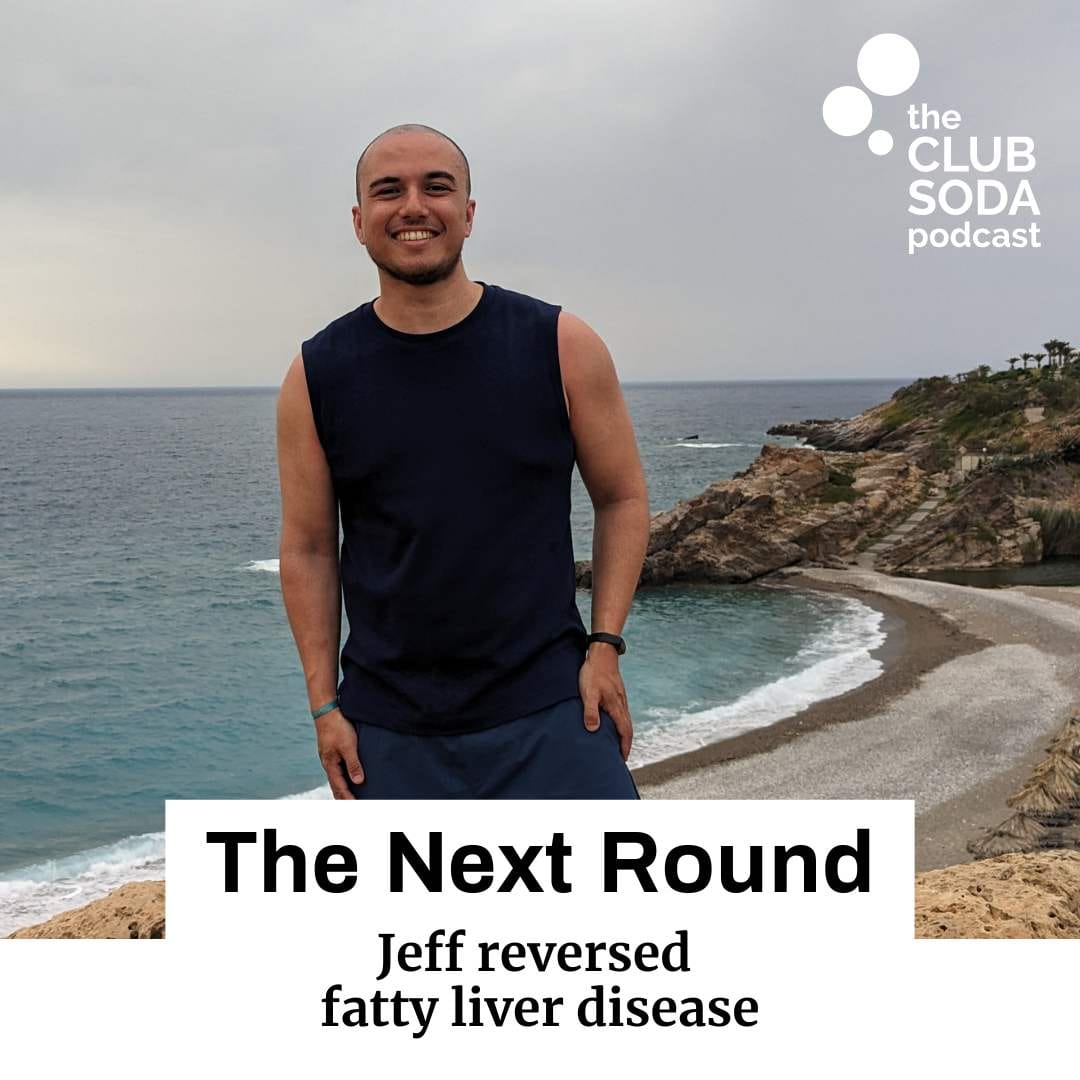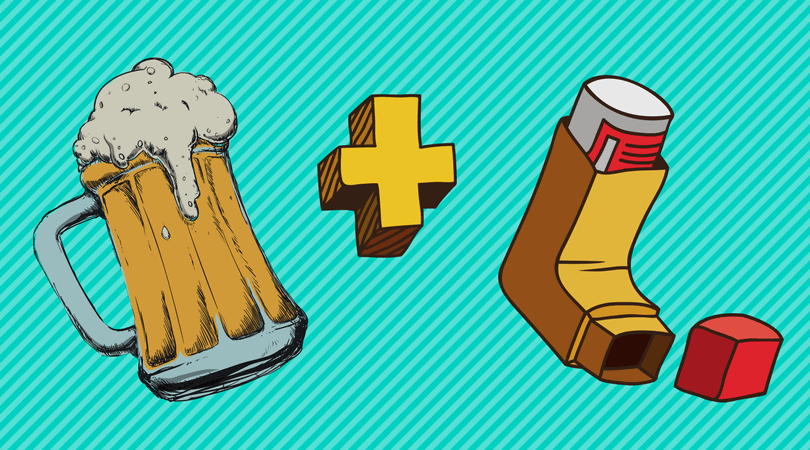
This website uses cookies to improve your experience. We'll assume you're ok with this, but you can opt-out if you wish. Read More
The Next Round: What happens after you change your drinking?

As it was World Asthma Day on Tuesday 1st May, we thought it would be a good time to write about the links between asthma and alcohol.
According to Asthma UK, 75% of people with asthma have reported that alcohol does indeed trigger their symptoms. It could be alcohol in general which worsens or triggers symptoms or it could be a particular drink that is the culprit. They’ve listed red wine as the top offender for asthma and alcohol issues, followed by white wine, then beer, then cider.
The Journal of Allergy and Clinical Immunology published a study in 2000 which reported that out of 350 adults who were asked to describe their triggers, 33% reported that alcohol has triggered an asthma attack at least twice. But again, wine was listed as a specific allergenic.
Well, it seems that it may not always be alcohol directly which aggravates symptoms – two common ingredients of alcoholic drinks are sulfites and histamines.
Histamine is the compound released in your body when you experience an inflammatory response, ie when you have an allergic reaction to something. Histamine is present in all alcohol types, as it’s produced by yeast and bacteria during the fermentation process – so if it’s the histamines present in alcohol in particular that are inflaming your symptoms, then you’ll probably experience this with all alcoholic drinks.
Sulfites, however, are predominantly found in wine. Sulfites will occur naturally during the wine-making process but more is also often added manually to stop fermentation at the desired time, and to act as a preservative to protect it from oxidation and bacteria – so even organic wines will include sulfites but usually at lower levels. Generally, white wines contain higher levels of sulfites than red and sweeter wines have higher levels than dry ones. Beer rarely contains sulfites but they may occasionally be present in cider.
Whilst there may be varying components to an exacerbation of asthma symptoms from an alcoholic drink, it’s worth noting that the alcohol itself may well also be causing symptom aggravation via its various side effects – such as heightening feelings of stress, sadness, and depression – which are symptom triggers in themselves. Asthma can often affect someone’s sleep pattern, as does alcohol (which we looked at in this article last year), so combining the two will further intensify the effects and result in even higher levels of stress and worsened asthma symptoms.
Hydration is also a factor as dehydration may make your symptoms worse, so if you are drinking alcohol then it’s important to stay hydrated – drink water alongside your drinks or in between and make sure you’ve quenched your thirst before drinking (we often drink more alcohol when we’re thirsty) – not to mention that drinking plenty of water helps flush out toxins.
Well, firstly it would make sense to try to identify which of these factors are the main culprit for you, or whether it’s a combination of all of them.
Have you already noticed that your symptoms are worse after you drink wine? Well, then it’s possible that it’s the sulfites which are predominantly affecting you. You could try switching to organic wines with lower levels or switching to spritzers to dilute the effects – or try alcohol-free wines which also contain lower levels of sulfites. Sulfites will of course still be present in wines which have gone through the de-alcoholisation process, as they will have already been through the fermentation process, but the levels are usually lower. You can check out five of our favourite alcohol-free wines.
If you still struggle with your symptoms with these options, then try switching to drinks which are similar to wine but which have not been through the fermentation process, so no appearance from sulfites, such as an elderflower cordial with sparkling water or a brand like Bees Knees bubbly (still contains grape) or Botonique (no grape).
If you feel that you’re affected by various types of alcoholic drinks then it could be the histamines or a combination of histamines and alcohol that are causing it. If you drink quite high levels of alcohol then the first step is to reduce your consumption. Histamines are impossible to avoid when drinking alcohol, so reducing your intake is the only way to truly avoid these effects. This will, in turn, reduce the asthma-aggravating effects of alcohol as you’ll usually find that your sleep and stress levels will improve. Alcohol-free beer will still contain certain levels of histamine but there are plenty of high quality, delicious craft drinks which are created for an adult palate, which you can switch into your routine in place of some of your alcoholic drinks.
We’ve tried to gather as much digestible information for you here, to help you to make an informed decision around the effects of drinking in relation to your asthma, but everyone is different – so do please consult with your GP if you’re concerned or unsure about your next steps. They may prescribe you with anti-histamines to help reduce the effects, or they could also recommend that you reduce your alcohol intake too. You’ll probably find that a combination of the two will work wonders!
This website uses cookies to improve your experience. We'll assume you're ok with this, but you can opt-out if you wish. Read More
| Name | Domain | Purpose | Expiry | Type |
|---|---|---|---|---|
| wpl_user_preference | joinclubsoda.com | WP GDPR Cookie Consent Preferences. | 1 year | HTTP |
| PHPSESSID | www.tickettailor.com | PHP generic session cookie. | 55 years | HTTP |
| AWSALB | www.tickettailor.com | Amazon Web Services Load Balancer cookie. | 7 days | HTTP |
| YSC | youtube.com | YouTube session cookie. | 55 years | HTTP |
| Name | Domain | Purpose | Expiry | Type |
|---|---|---|---|---|
| VISITOR_INFO1_LIVE | youtube.com | YouTube cookie. | 6 months | HTTP |
| Name | Domain | Purpose | Expiry | Type |
|---|---|---|---|---|
| _ga | joinclubsoda.com | Google Universal Analytics long-time unique user tracking identifier. | 2 years | HTTP |
| sbjs_migrations | joinclubsoda.com | Sourcebuster tracking cookie | 55 years | HTTP |
| sbjs_current_add | joinclubsoda.com | Sourcebuster tracking cookie | 55 years | HTTP |
| sbjs_first_add | joinclubsoda.com | Sourcebuster tracking cookie | 55 years | HTTP |
| sbjs_current | joinclubsoda.com | Sourcebuster tracking cookie | 55 years | HTTP |
| sbjs_first | joinclubsoda.com | Sourcebuster tracking cookie | 55 years | HTTP |
| sbjs_udata | joinclubsoda.com | Sourcebuster tracking cookie | 55 years | HTTP |
| sbjs_session | joinclubsoda.com | SourceBuster Tracking session | Session | HTTP |
| Name | Domain | Purpose | Expiry | Type |
|---|---|---|---|---|
| mailchimp_landing_site | joinclubsoda.com | Mailchimp functional cookie | 28 days | HTTP |
| __cf_bm | tickettailor.com | Generic CloudFlare functional cookie. | Session | HTTP |
| NID | google.com | Google unique id for preferences. | 6 months | HTTP |
| Name | Domain | Purpose | Expiry | Type |
|---|---|---|---|---|
| _ga_10XZMT03ZM | joinclubsoda.com | --- | 2 years | --- |
| AWSALBCORS | www.tickettailor.com | --- | 7 days | --- |
| cf_clearance | tickettailor.com | --- | 1 year | --- |
| VISITOR_PRIVACY_METADATA | youtube.com | --- | 6 months | --- |
Join Club Soda for 10% off your first order of drinks for UK delivery. Plus get our latest news and special offers for members to choose better drinks, change your drinking and connect with others.
If you get an error message with this form, you can also sign up at eepurl.com/dl5hPn